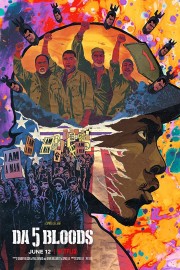Da 5 Bloods
Oscar-winner Spike Lee has a great ring to it. He didn’t need an Oscar to be validated as one of the great filmmakers of all-time, but his win for Best Adapted Screenplay for “BlackKklansman” was just satisfying to see, honoring one of the most important filmmakers of a generation. To follow it up, he has created a personal, messy war epic that draws us into every one of its 154 minutes, and allows us a glimpse into the effects of PTSD on veterans, and Black Americans, in a way that feels timely and necessary without being cloying. Lee couldn’t be cloying if he tried; he’s always after creating a genuine connection with his audience, whether it makes us feel comfortable or not.
Rather than make a conventional war film, which he seemed to try and do with his 2008 WWII film, “Miracle at St. Anna,” Lee shows us four Vietnam vets returning to the country as old men. They are members of a unit whom called themselves Da 5 Bloods- Paul (Delroy Lindo), Otis (Clarke Peters), Eddie (Norm Lewis) and Melvin (Isiah Whitlock Jr.)- and they have two purposes for coming back- to find the remains of their beloved captain, Stormin’ Norman (Chadwick Boseman), as well as find some US gold they hid from a downed plane during the war. They would have come back for both earlier, but the war destroyed all the landmarks they knew for where they hid it; recently, a mudslide dislodged part of the plane, so it is time to go back. They meet up in Vietnam with a guide (Johnny Nguyen), make arrangements to get the gold out of the country, and Paul’s son David (Jonathan Majors) has come to keep and eye on his father. Throughout, we see flashbacks of their time in the war, and get a feel for who Norman was, and what he meant to them.
Lee begins the film with a montage of still photographs of Civil Rights leaders and others whom were killed during the ’60s and ’70s. Norman’s men saw him as their own Malcolm X and Martin Luther King Jr., as another Black leader immorally shot down at the prime of his life, in part because of a government fighting against an “other” that sees them as a threat. One of the things Lee does so well in many of his best films is tying ideas that seem to not be connected into a larger theme or notion about humanity in general. Here, it’s connecting the atrocities and discrimination of Black Americans to the unjust war that was fought in Vietnam, all in the service of white men who don’t regard them as human. In this case, white men are represented by Jean Reno as the French banker whom the Bloods look to in trying to shelter their gold for them, and who has no qualms with pitting both sides against one another to try and benefit themselves. Lee has never been subtle, but it’s that blunt-force social commentary that, I think, makes him such a great artist.
The brunt of the film focuses on the remaining Bloods, as well as David. One of the devices Lee uses throughout the film is, when we flashback to the men in Vietnam, they are not de-aged a la “The Irishman,” but shown in a way representative of how they are in the present day. It’s part of Lee’s way of showing the impact the war on these men, and how they never really could get past what they went through. The film’s emotional center is in dealing with trauma, whether that’s the horrors of war or from systemic discrimination at home, and no where is that more acutely examined is in the character of Paul. His “Make America Great Again” hat might have you making assumptions about the character, but unless those assumptions revolve around the alienation of a race betrayed by the society at large, you’d probably be incorrect. There’s more than just systemic traumas to Paul’s life, however, there are personal ones that he’s struggling with, as well. Lindo is remarkable in the role, and he has tour de force moments all the way through that allow us to see the character with equal amounts terror and empathy; you’ll see what I mean. The rest of the cast delivers great work, as well, but Lindo is the one you’ll remember.
“Da 5 Bloods” is an effective, entertaining, and painful film to watch because of the way Lee and his co-writers- Danny Bilson, Paul De Meo and Kevin Willmott- bring together a lot of genres, and do not just center on making a war film. The film is a journey like “Apocalypse Now,” but also a film about madness akin to “The Treasure of the Sierra Madre” and a film about friends reuniting and reliving their past. The score by Terence Blanchard, which is aided by Marvin Gaye songs, brings the film’s emotional weight to every note, while the cinematography by Newton Thomas Sigel is rich in how it moves between framing formats, and finds a way to capture the intimate and epic in Lee’s powerful film.










